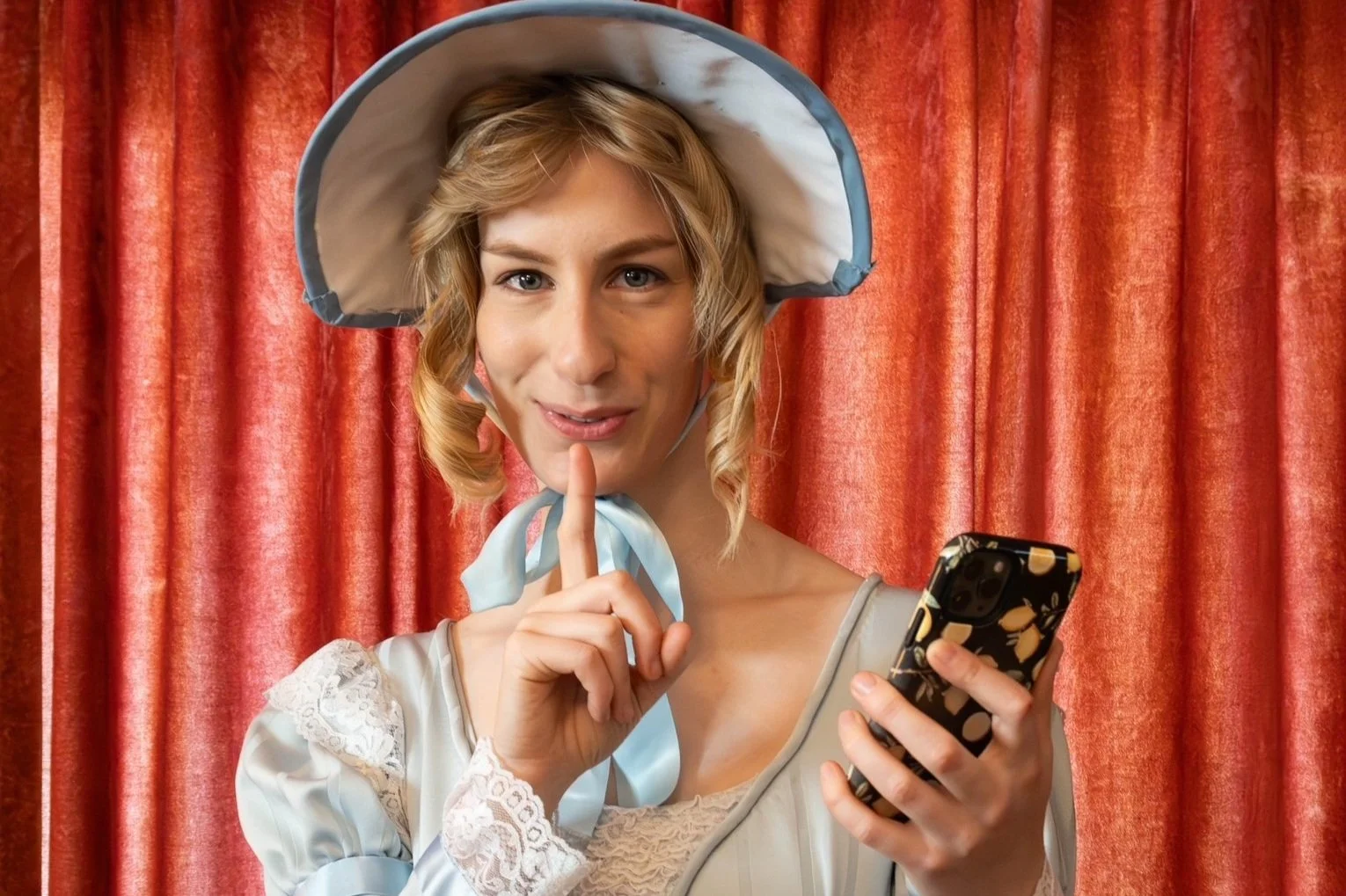Teenage Dick recasts Richard III with actors fit to play disabled characters
New York City-based artist Christopher Imbrosciano, who has cerebral palsy, takes on the starring role in Vancouver premiere of Mike Lew’s play
Christopher Imbrosciano, Teenage Dick, The Arts Club Theatre Company. Photo by David Cooper
The Arts Club Theatre Company, in collaboration with Bard on the Beach Shakespeare Festival and Realwheels Theatre, presents Teenage Dick at the Newmont Stage at BMO Theatre Centre to March 5 (opening night is February 15)
IN TEENAGE DICK, Brooklyn-based playwright Mike Lew sets Shakespeare’s Richard III in a modern-day American high school and looks at status, power, and disability politics through the eyes of a student. Richard Gloucester is a somewhat nerdy 16-year-old who is determined to win the vote for class president no matter what it takes and who gets bullied because of his disability. In Lew’s note to the dark comedy’s future directors, he explicitly states: “Cast disabled actors for Richard and Buck. They exist and they’re out there….In no case should able-bodied actors ‘play’ disabled.”
Shakespeare’s nefarious Richard has an unnamed disability but is described as walking with a limp, having a withered arm, and being “bunchback’d”. Lew, an esteemed Asian-American playwright and Guggenheim Fellow, was commissioned to write the 2018 play by Gregg Mozgala. The actor, who starred in Cost of Living on Broadway and heads a theatre company called The Apothetae, which spotlights the disabled experience, has cerebral palsy. Lew’s text offers two versions for Richard: one for an actor with cerebral palsy and another one for an actor with hemiplegia, a form of paralysis that affects one side of the body. The role of Buckingham is written for a performer who uses a wheelchair.
It’s a radical departure in the history of the 1593 Richard III, which has seen mostly able-bodied actors on stages.
For the Vancouver premiere of Teenage Dick, Christopher Imbrosciano will take on the starring role. Based in New York City, the multidisciplinary artist, who has cerebral palsy, has trained in theatre, voice, dance, puppetry, and stage combat and appeared in TV, film, and theatre productions. His most recent local performance was as John in The Arts Club’s 2019 production of Martyna Majok’s Cost of Living.
Imbrosciano discovered Teenage Dick when he was invited to workshop the play at the Eugene O’Neill Theatre Center in Connecticut. He fell in love with the script from the moment he first read it.
“It was the first time having cerebral palsy was not only a benefit to this character, but a necessity,” Imbrosciano tells Stir. “Richard explains how my body works in casual conversations with other characters. It’s so liberating. For once I am not too disabled for the role or not disabled enough.
“What I bring to this play with my whole self, my body, and my lived experience as a person with CP is exactly what is needed,” he says. “It’s incredible.”
In fact, Imbrosciano describes the experience as a “dream come true”, calling The Arts Club’s Ashlie Corcoran his “favourite director of all time”. Teenage Dick also stars Cadence Rush Quibell as Barbara “Buck” Buckingham, Elizabeth Barrett as Clarissa Duke, Cassandra Consiglio as Anne Margaret, Jennifer Lines as Elizabeth York, and Marco Walker-Ng as Eddie Ivy. The Arts Club has several special events lined up to complement the production of Teenage Dick. (See below for more.)
Imbrosciano found his passion for acting early on in life; it became an outlet during so many difficult and painful experiences, physical and emotional.
“I was recovering from my first major surgery to enable me to walk, when my physical therapist noticed I used my imagination to escape the pain,” Imbrosciano says. “She recognized that every exercise or activity had to be a game with a story, usually with me playing the main character. That is when she suggested to my mom that I attend a theater camp. She thought I would love it. And I did.
“From that experience I got cast in my first professional production of Peter Pan playing Michael Darling,” he says. “I loved living in my imagination and seeing the world from different character’s perspectives. That’s what got me hooked, and I haven’t looked back.”
Christopher Imbrosciano.
While he has carved out a successful path in the performing arts, Imbrosciano is quick to point out that it has not come easy. And he says there’s a long way to go when it comes to actual representation and inclusion of people with disabilities in the arts world.
“I remember very early on either not being seen for a role with a disability at all or being seen but thought of as too much of a liability,” Imbrosciano says. “I often lost roles to non-disabled performers. It was very frustrating. It still is sometimes. Unfortunately, Hollywood is still casting able-bodied stars in disabled roles.”
Misconceptions abound when it comes to disability in general and cerebral palsy in particular. When asked if there’s anything he’d like people to know about his experience with CP, he says: “Cerebral palsy is a huge umbrella term. It can affect someone in a million different ways. Just like all disabilities it’s about how it affects the individual. You should never make assumptions about someone with a disability—about what they can or cannot do. And please, for the sake of all disabled people everywhere, we know you were just trying to be empathetic and show you care and understand, but please stop comparing your broken foot or sprained ankle to our everyday lived disabled life: It is not the same thing. The world is still incredibly inaccessible to us.”
Martha Naguiat-Ebro
The Arts Club is expanding on Teenage Dick’s run in Vancouver to include additional programming that engages with the disabled community on and off the stage. Headed by The Arts Club’s year-round accessibility coordinator, Amy Amantea, the special events include Crip Cabaret: A Reclamation! (February 26 at 7 pm at Newmont Stage at the BMO Theatre Centre) and the Disability Artists Market (February 26 and March 4, which is the date of a relaxed performance.)
On March 5, The Arts Club offers a VocalEye live Description, for people who are blind or partially sighted, at the Stanley Industrial Alliance Stage. Ten minutes before the show begins, VocalEye patrons will hear a brief description of the set, characters, props, and costumes. When the show begins, those patrons don headsets to hear the VocalEye describer, who will convey important visual information and physical action, live, between the actors' lines. The description is not audible to the general audience.
Amantea is a creator and performer who lives with legal blindness, neurodiversity, chronic illness, and pain.
“I know what it feels like to not belong on a stage.” Amantea tells Stir. “My life’s work is about increasing representation of disability experience on our stages and on our screens. Twenty-five percent of the population lives with a disability – that includes invisible disabilities, physical disabilities, mental illness. But where are we on our stages or on our screens? We’re not there. Teenage Dick is so important in making steps forward.”
“Crip Cabaret is a reclamation of the word crip”, Amantea says. “We get to use it. Nobody else does. It’s our community word.” For the February 26 event, Amantea has invited artists from the disability community—poets, songwriters, storytellers, dancers and more—who will be sharing work on stage in a casual environment, with tickets priced at $5 each. Amantea will perform a piece of slam poetry called Inappropriate Questions.
The Disability Arts Market features neurodiverse vendors and artisans, including a painter, jeweller, knitter, and more.
The March 4 relaxed performance is significant in many ways. “It’s really important to us to do a relaxed performance, which is geared to audience members who live with neurodiversities who don’t typically get included in the mainstream theatre environment,” Amantea says. “We don’t sell a full house, so people can get up and move around. You can bring fidget spinners, you can knit in your seat. If you’re feeling overstimulated and you need to leave the theater in the middle of the show, there’s a relaxation station outside of the theatre, a place where people can just chill out or work on puzzles. We always offer comps and discounted tickets to make sure community members can access the theatre experience as equitably as possible.”
In addition, The Arts Club received a grant from Disability Alliance of BC to welcome two deaf-blind brothers to the performance; each will have two intervenors who will use a series of touches and taps on the body to interpret the show.
Put together, the Arts Club’s presentation of Teenage Dick and its related programming aim to make inclusion more than a buzzword.
















